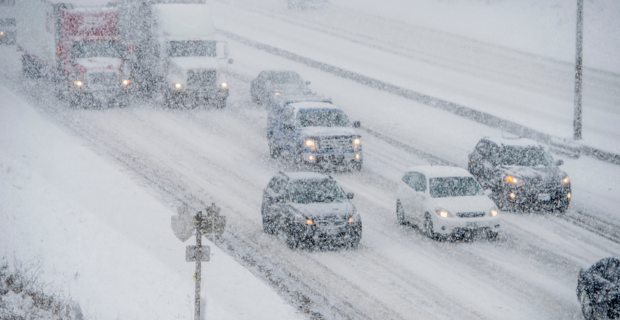Date Published: 2024/10/25
Read Time: mins
Be prepared for winter roads

When the temperature drops and the snow starts to fall, our roads become very dangerous. Some helpful tips to stay safe during your commute are being prepared for winter roads, adapting to the roads you’re travelling on, and being mindful of where you’re driving.
Let's look deeper at some of these safe winter driving tips.
Being prepared before you drive
- Make sure your vehicle has winter tires. Whether there's fresh snow or black ice, winter tires will help with braking and driving through the winter.
- Only use windshield washer fluid for -45-degree Celsius weather. All-season windshield washer fluid can freeze and make driving very dangerous. Make sure you top up before long drives.
- Remove all snow and ice from your vehicle before driving. Having a full range of vision is crucial to being safe on the road. The top of your vehicle can also develop a sheet of ice, which can be hazardous to other drivers around you.
Have a plan for hazardous conditions
- Be adaptive, not reactive. If there is an excessive amount of snow on the road, avoid switching lanes or passing unnecessarily.
- Keep your distance from drivers ahead of you to give yourself enough time to brake. Braking on slippery roads requires more time and care to avoid sliding.
- Avoid panic braking. When you hit a patch of ice, braking in a panic can make your vehicle skid out of control.
- Here are some helpful tips to avoid skidding on slippery roads:
- Slow down and give yourself extra time for travel.
- Be cautious when braking, turning, and changing lanes.
- Remain calm, avoid sudden braking, and turn the steering wheel slowly to remain in control of your vehicle.
- If you skid, release the brake and steer in a safe direction. Be mindful not to turn too hard to avoid spinning.
Be mindful while driving
- In areas where snowbanks could be blocking your vision, drive slowly and be patient; there could be pedestrians you might not see or children playing in the snow.
- Focus on the road and be alert. Distracted drivers are eight times more likely to be in an accident1. Put the phone down and keep your eyes on the road.
- When driving behind snow plows, it is important to stay back, not pass, and be patient. Let the snowplows make the roads safer for everyone.
In case of an accident
Having a medical kit on hand can give you peace of mind when driving long distances. Try to keep your phone charged in case you need to call for help in an emergency. Here is a guideline for what to do after an on-road collision. If you need to make a claim, contact an Orbit insurance broker. We're here to help!
Sources: